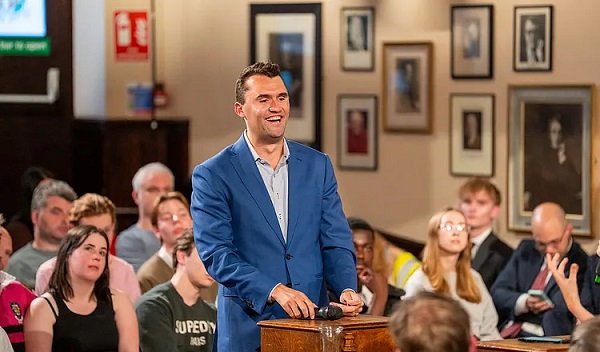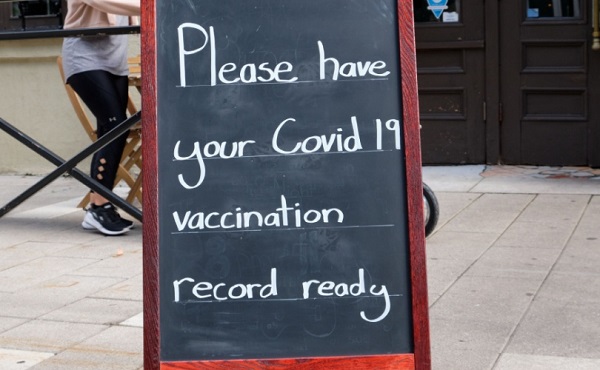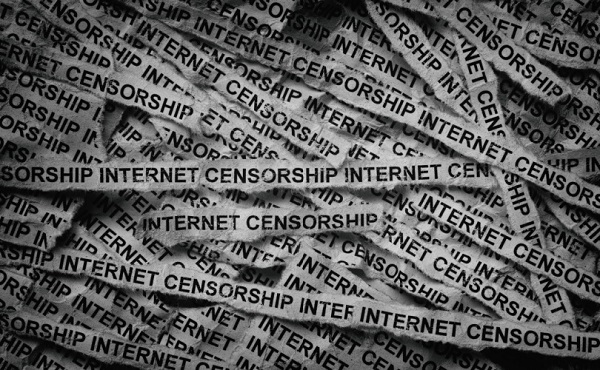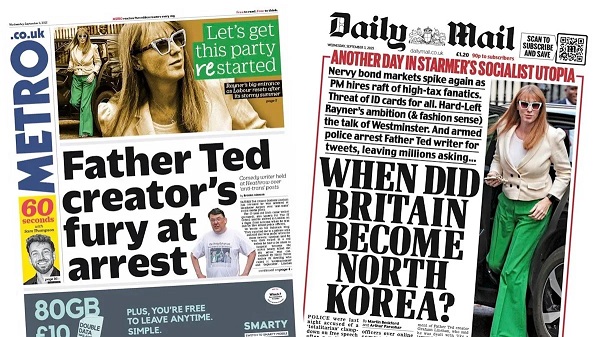Great Reset
U.S. rejects WHO pandemic amendments, citing threat to sovereignty

Quick Hit:
- The U.S. State Department and HHS transmitted the official rejection of the 2024 amendments to the WHO’s IHR.
- Officials cited threats to national sovereignty, vague terminology, and the WHO’s political susceptibility—particularly to China—as grounds for rejection.
- The amendments would have mandated WHO-led responses, digital health documentation, and “equitable access” initiatives regardless of U.S. withdrawal from the WHO.
RFK Jr. just announced he has rejected the WHO’s draconian new pandemic treaty.
Every American should care about this.
“Last year, the World Health Organization’s governing body made some far-reaching amendments to its international health regulations, otherwise known as the… pic.twitter.com/GI9UzsTrKv
— MAHA PAC🗽 (@MAHA_PAC) July 18, 2025
Diving Deeper:
The rejection represents a sharp rebuke of the World Health Assembly’s 2024 amendments to the International Health Regulations (2005), which sought to centralize global pandemic decision-making power within the WHO. Kennedy and Rubio emphasized the amendments’ “vague and broad” language and their potential to create policy rooted in politics and global “solidarity” rather than science and national interest.
Among the most controversial changes were new authorities for the WHO to unilaterally declare health emergencies, coordinate international responses, and guide member states toward “equitable access” to vaccines and other health commodities. The amendments also encouraged countries to implement digital health documents—raising red flags for privacy and surveillance concerns.
“The amendments risk unwarranted interference with our national sovereign right to make health policy,” the joint statement read. Kennedy and Rubio specifically criticized the lack of public input in drafting the new rules and warned that WHO directives could suppress legitimate scientific debate and restrict Americans’ freedom of speech under the guise of “controlling misinformation.”
The officials pointed to the WHO’s well-documented failures during the COVID-19 pandemic, including its deference to the Chinese Communist Party, as a stark example of why international bodies should not be granted binding authority over U.S. domestic policy. “These amendments… fail to adequately address the WHO’s susceptibility to political influence and censorship—most notably from China—during outbreaks,” the statement noted.
Even more alarming, the statement highlighted that the amended rules would have bound the U.S. regardless of its current status in the WHO, essentially imposing obligations on a nation that is no longer part of the organization. This drew particular concern from Rubio, who has long warned against ceding U.S. autonomy to global institutions.
In reaffirming their commitment to “put Americans first,” Kennedy and Rubio vowed to continue resisting international encroachments on U.S. freedoms. “We will not tolerate international policies that infringe on Americans’ speech, privacy, or personal liberties,” they declared.
This formal rejection marks a victory for critics of globalism and top-down health mandates, signaling that under the current administration, American decision-makers are prioritizing sovereignty, transparency, and constitutional protections over global consensus driven by unelected bureaucrats.
Health
Canadians left with no choice but euthanasia when care is denied

From LifeSiteNews
Ontario’s euthanasia regulators have tracked 428 cases of possible criminal violations without a single criminal charge being laid.
Once again, a government report affirmed what every Canadian should know by now: People are being killed by euthanasia because they cannot access the care they actually need and in some cases are denied that care.
The “choice” that is left to them is a lethal injection. Ontario’s Medical Assistance in Dying (MAiD) Death Review Committee’s (MDRC) latest report, “Evaluating Incurability, Irreversible Decline, and Reasonably Foreseeable Natural Death,” highlights this fact once again.
As Dr. Ramona Coelho, an advocate for people with disabilities and one of the most eloquent opponents of Canada’s MAiD regime highlighted in her analysis of the report, Health Canada dictates that a “person can only be considered incurable if there are no reasonable and effective treatments available (and) explicitly state that individuals cannot refuse all treatments to render themselves incurable, and thereby qualify for MAiD.”
However, the MDRC’s report cites cases that do not appear to qualify:
Consider Mrs. A: isolated, severely obese, depressed, and disconnected from care; she refused treatment and social support but requested MAiD. Instead of re-engaging her with care, MAiD clinicians deemed her incurable because she refused all investigations, and her life was ended.
Or Mr. B: a man with cerebral palsy in long-term care, he voluntarily stopped eating and drinking, leading to renal failure and dehydration. He was deemed eligible under Track 1 because his death was consequently considered “reasonably foreseeable.” No psychiatric expertise was consulted despite signs of psychosocial distress.
Or Mr. C: a man in his 70s with essential tremor, whose MAiD provider documented that his request was mainly driven by emotional suffering and bereavement.
In short, Coelho concludes, “Canada’s legal safeguards are failing. Federal guidelines are being ignored. The public deserves to know: Is Canada building a system that truly protects all Canadians – or one that expedites death for the vulnerable?” It has been clear what kind of system we have created for some time, which is why Canada is considered a cautionary tale even in the UK, where assisted suicide advocates violently and indignantly object to any comparisons of their proposed legislation and the Canadian regime.
The National Post also noted examples found in the MRDC’s report, noting that: “A severely obese woman in her 60s who sought euthanasia due to her ‘no longer having a will to live’ and a widower whose request to have his life ended was mainly driven by emotional distress and grief over his dead spouse are the latest cases to draw concerns that some doctors are taking an overly broad interpretation of the law.”
None of this seems to concern the federal government, much less law enforcement. Horror stories are simply not addressed, as if ignoring them means that they did not happen. Constant revelations of lawbreaking are met with silence. “A quarter of all Ontario MAiD providers may have violated the Criminal Code,” journalist Alexander Raikin warned last year in The Hub. “Does anyone care?” In fact, Ontario’s euthanasia regulators had tracked 428 cases of possible criminal violations – without a single criminal charge being laid.
“Canada’s leaders seem to regard MAiD from a strange, almost anthropological remove: as if the future of euthanasia is no more within their control than the laws of physics; as if continued expansion is not a reality the government is choosing so much as conceding,” Elaina Plott Calabro wrote in The Atlantic recently. “This is the story of an ideology in motion, of what happens when a nation enshrines a right before reckoning with the totality of its logic.”
There is an opportunity to stop the spread of Canada’s MAiD regime. MPs Tamara Jansen and Andrew Lawton are championing the “Right to Recover” Act, which would make it illegal to euthanize someone whose sole qualifying condition is mental illness. I urge each and every reader to get involved today.
Censorship Industrial Complex
UK’s top cop wants to ‘stop policing tweets’: report

From LifeSiteNews
By Frank Wright
‘I don’t believe we should be policing toxic culture wars debates,’ said Sir Mark Rowley, chief of the London Metropolitan Police.
In a remarkable shift, Britain’s most senior police officer is to recommend changes to the law which could allow police to “stop policing tweets” within weeks.
Sir Mark Rowley, chief of London’s Metropolitan Police, said he will approach the Home Secretary with proposals which could see police return to policing real-life crime.
Sources close to Rowley told the UK’s Daily Telegraph:
He wants Shabana Mahmood, the new Home Secretary, to change the rules so police officers are not required to record or investigate complaints when there is no evidence the suspect intended real-world harm.
The change would be a remarkable departure from the crackdown on “non-crime hate incidents,” which have seen British people given sentences of several years for remarks made online.
Rowley’s move to change the law comes alongside the UK Labour government’s proposal to introduce digital ID – which could tie access to bank accounts and work to online speech.
Return to common sense policing?
The Telegraph’s source said Rowley “is proposing a shake-up of legislation that would give officers greater discretion to use ‘common sense’ when deciding whether to record and investigate complaints about comments on social media.”
The proposed change follows the arrest of comedy writer Graham Linehan, prompting the Metropolitan Police Chief to respond.
Responding to Linehan’s arrest, Rowley said on September 3 that a return to common sense was needed as a series of high-profile arrests over “non-crime hate incidents” was undermining public trust in the police.
He said the policies of successive governments had left the police in an “impossible position” over hate speech laws.
“I don’t believe we should be policing toxic culture wars debates,” Rowley added in a September 9 report, before claiming the police were not responsible for their actions.
“[O]fficers are currently in an impossible position. I have offered to provide suggestions to the Home Office on where the law and policy should be clarified.”
Telegraph journalist Allison Pearson, who was doorstepped by police last November for a tweet described as a “non-crime hate incident,” responded on September 9 by saying Rowley’s step towards defending free speech was “disingenuous” at best.
“At the risk of being arrested,” Pearson said, “I suggest Met chief Mark Rowley is a total muppet.”
Commenting on the recent arrest of comedian Graham Linehan for online speech, she added, “It is disingenuous in the extreme for the commissioner to say officers’ hands are tied in cases like that of Graham Linehan.”
Pearson explains that Linehan, famous for writing sitcoms, was arrested by five armed police after a “notorious trans activist” reported his tweets to police.
Rowley’s claim is that guidelines to police compel them to treat such appeals as crime reports, leaving no room for discretion.
Pearson then refers to the many real-life crimes to which British police do not routinely respond – even over decades:
It’s perfectly clear that the police have discretion to ignore complaints, even crimes, if they want to. Let’s see now:
Phone theft – ignored.
Shoplifting – essentially legal.
Carjacking – we’ll send you a crime number.
Burglaries – help yourself, lads!
Sexual harassment, child gang rape – er, sorry, cultural sensitivities.
Pearson concludes that the police chief is himself being dishonest – at best – in saying that speech crime laws tie the hands of officers.
For Sir Mark to claim that his officers were unable to use their common sense and ignore a complaint from a notorious trans activist about [Linehan] is to insult the public’s intelligence.
Baronness Winterbourne of the House of Lords responded, recommending that “[i]nstead of blaming Parliament for your officers’ inability to think for themselves intelligently, perhaps you might firmly tell them, please, to stop being stupid.”
En désespoir pic.twitter.com/Dm7XViTZ8s
— Emma Harriet Nicholson (@Baroness_Nichol) September 5, 2025
As the latest Telegraph report shows, government advice to police already exists – which has not prevented the policing of so-called “non-crime hate incidents.”
More than 13,200 non-crime hate incidents were recorded by police in the 12 months to June 2024, a similar number to the previous year, despite new guidelines requiring police to investigate only ‘when it is absolutely necessary and proportionate and not simply because someone is offended.’
Rowley was also recorded on a UK radio show defending the officers who carried out Linehan’s arrest.
Graham Linehan’s case is but one of many in which British people have been prosecuted for online speech. As the Free Speech Union reported in April 2025, new data showed that over 12,000 people in Britain are arrested for speech crimes every year.
Hitchens: Disband the police?
Peter Hitchens, a veteran conservative commentator and staunch Christian, spoke out on GB News – calling for the British police to be completely abolished and replaced.
Peter Hitchens calls for the police to be disbanded and rebuilt from scratch, accusing them of becoming 'a sinister menace to freedom of speech'.
'They’re not responsible for crime anymore. They’re a politically correct body who think they’re policing thought.' pic.twitter.com/EylPbMyviP
— GB News (@GBNEWS) September 10, 2025
Hitchens, a devout Christian, said the British police should be “disbanded” as they have become a “sinister menace to the freedom of speech.”
“They’re not responsible for crime anymore,” Hitchens explained. “They’re a politically correct body who think they’re policing thought.”
He told GB News’ Michelle Dewberry that “the police don’t believe they should be doing what we think they should be doing. They do believe they should be arresting people for incorrect tweets. The only solution is to disband them and start again.”
Elsewhere Hitchens argued this was no novel development, saying this “new style of policing” went back 20 years.
Two-tier Keir Starmer
The embattled Prime Minister Keir Starmer has long been accused of “two-tier” policing in cracking down on “far-right thugs” who commit online speech crimes.
As the murder of Charlie Kirk focuses attention on the toxic speech of the left, Britain’s justice system sees no evil when left-wingers call for the collective murder of people on the right.
Whilst former Conservative councilor Lucy Connolly received a 31-month sentence for an angry tweet about illegal migrants, a councilor for Starmer’s own Labour Party was found not guilty of incitement to violence after demanding that everyone he saw as “far right” be murdered.
Ricky Jones was declared innocent after publicly calling for his comrades to “cut the throats” of the so-called “disgusting Nazi fascists” who were protesting over the murder of children by a man of migrant heritage. Three girls were killed in Southport by a Rwandan youth last July. After stabbing the nine children in a frenzied assault, Axel Rudakubana told police, “It’s a good thing those children are dead.”
When angry protests broke out at the murders, Jones responded on video, saying of the so-called “far-right” protesters: “We need to cut all their throats and get rid of them all.”
Jones was freed, Connolly was jailed.
Talking of calls for violence,
Violent extremist RICKY JONES was released on bail until his trial in January despite the severity of his crime.
Protesters have been jailed for very minor crimes yet their vile ex Labour Party councillor gets totally different treatment.
This… https://t.co/XW4Oo2lB4R pic.twitter.com/7C2PtZL9kW
— Antifa Public Watch official (@UnmaskedAntifa) October 23, 2024
Despite the obvious dangers in preferring the policing of speech to genuine threats and crimes, there seems to be no cause for concern from the point of view of Britain’s prime minister.
During Wednesday afternoon’s questions, Sir Keir Starmer was asked whether he would commit to revising speech laws to “ensure legitimate free expression is protected.”
Starmer replied with a stock response: “I’ve been clear throughout, we must ensure the police focus on the most serious issues and the issues that matter most to our constituencies and all communities.”
He ended by saying he was proud of Britain’s long history of free speech, which he said he would always protect.
“And that includes tackling issues like antisocial behavior, knife crime and violence. And we have a long history of free speech in this country. I’m very proud of that, and I will always defend it.”
-

 Crime2 days ago
Crime2 days agoCharlie Kirk ASSASSINATED
-

 Opinion2 days ago
Opinion2 days agoThe Charlie Kirk I Knew
-

 Alberta1 day ago
Alberta1 day agoAlberta deserves a police force that actually reflects its values
-

 COVID-192 days ago
COVID-192 days agoCanada’s COVID mandates linked to rise in ‘unexplained deaths’: new report
-

 Crime1 day ago
Crime1 day agoCharlie Kirk Killer’s Ammo Reportedly Marked With Transgender, Anti-‘Fascist’ Messages
-

 Alberta1 day ago
Alberta1 day agoOPEC+ chooses market share over stability, and Canada will pay
-

 Crime1 day ago
Crime1 day agoFormer FBI Agent Says Charlie Kirk Assassination May Have Been ‘A Professional Hit’
-

 Alberta1 day ago
Alberta1 day agoProvincial pension plan could boost retirement savings for Albertans








